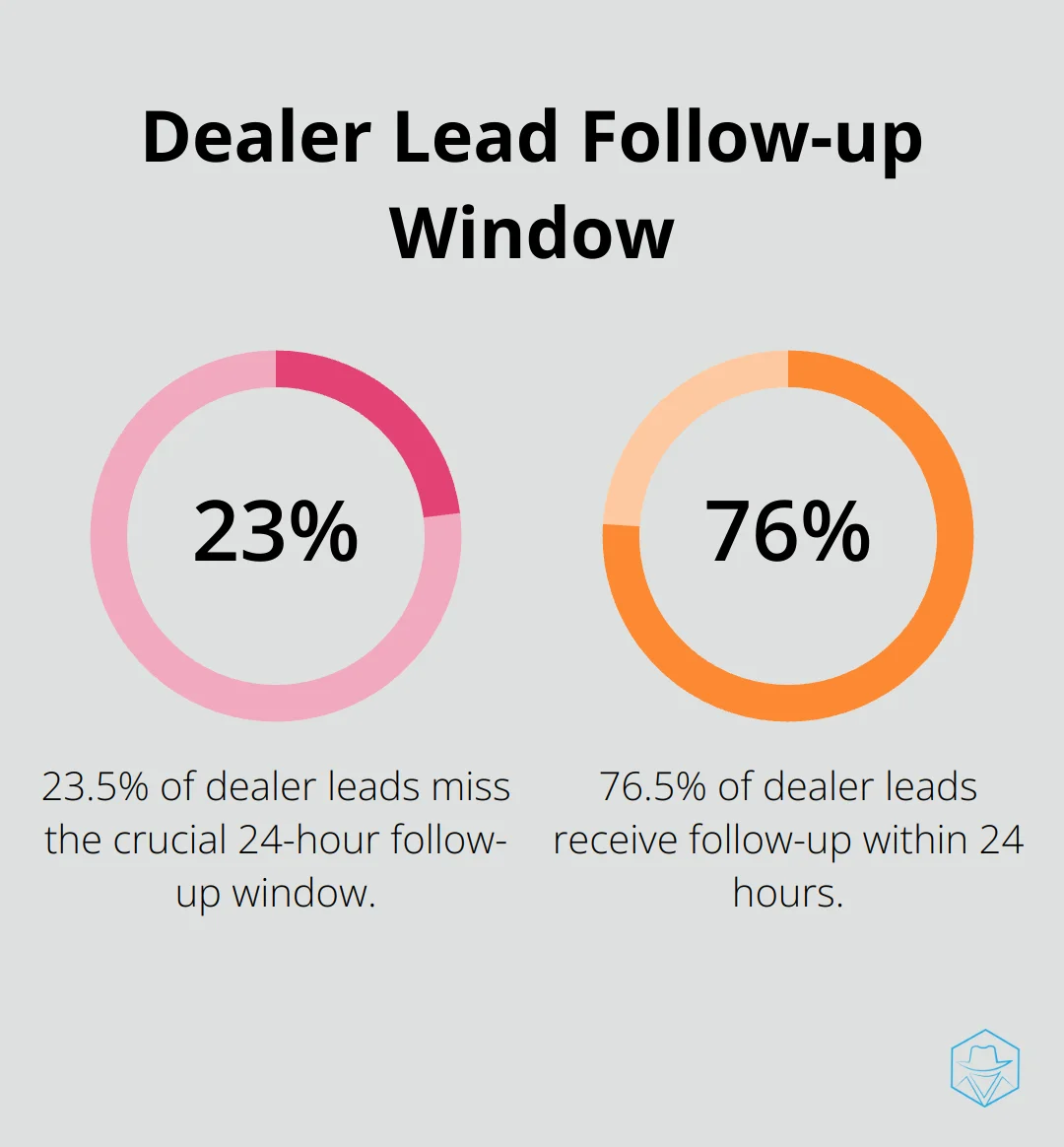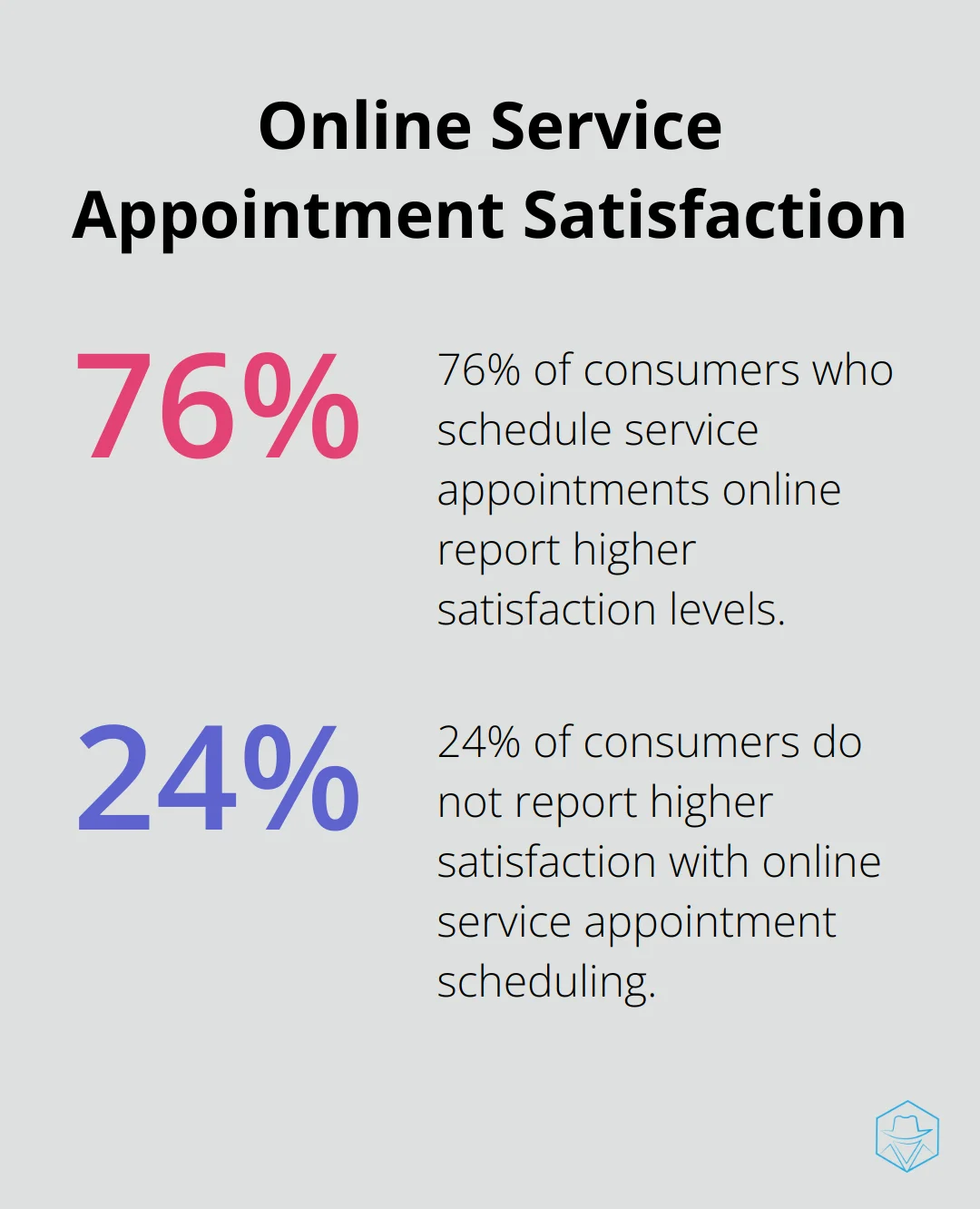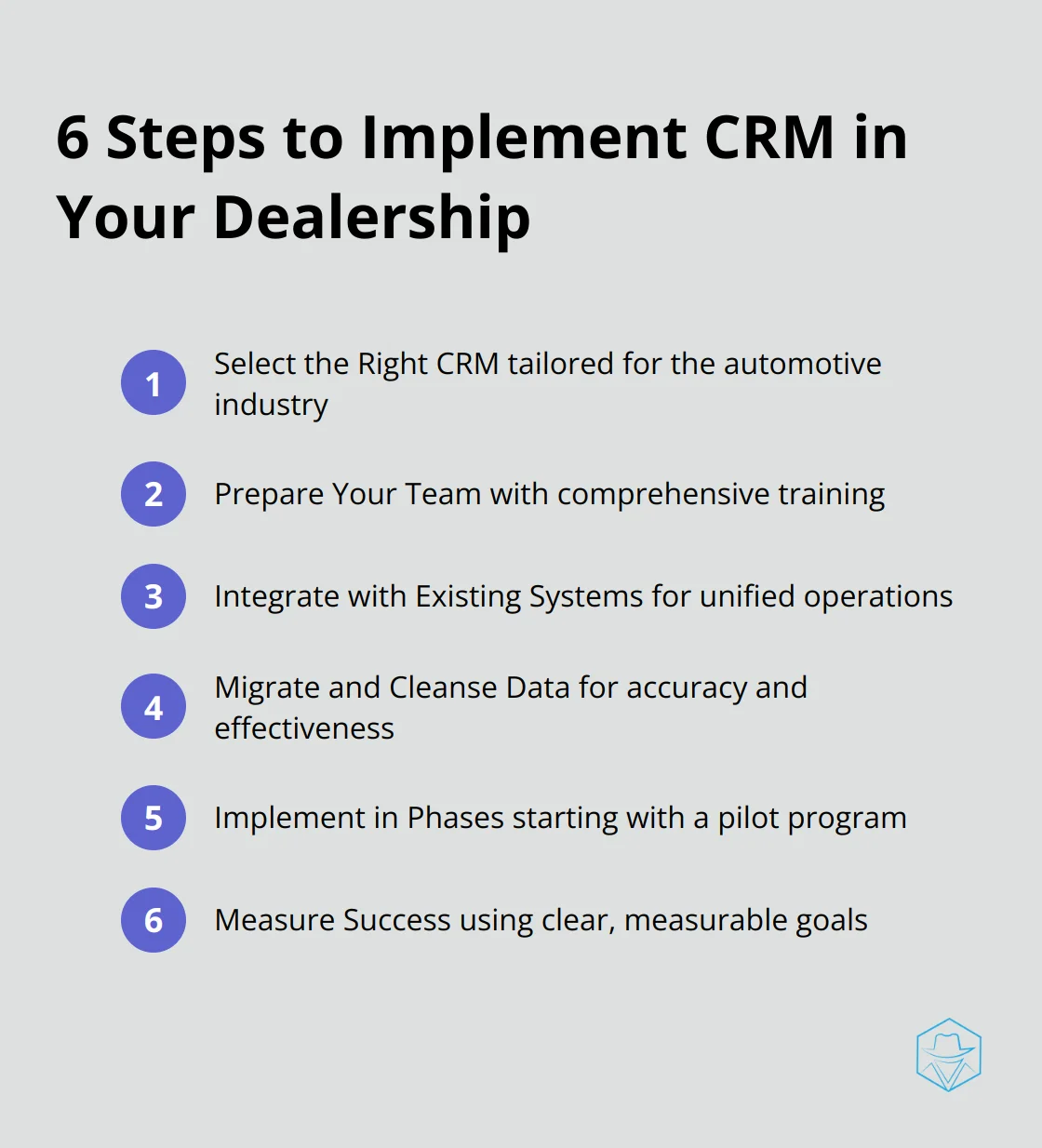Automobile CRM: Drive Sales in the Automotive Industry

At Drop Cowboy, we’ve seen how the right tools can transform businesses. In the automotive industry, Customer Relationship Management (CRM) systems are becoming indispensable for driving sales and enhancing customer experiences.
An effective automobile CRM can revolutionize how dealerships operate, from managing inventory to personalizing marketing campaigns. In this post, we’ll explore how CRM solutions can boost your automotive sales and streamline your operations.
How CRM Boosts Automotive Sales
Decoding Customer Behavior
CRM systems in the automotive industry unlock the power of customer data, transforming sales processes and boosting bottom lines. These systems analyze past purchases, service history, and interaction data to provide invaluable insights into customer decision-making. A study by Cox Automotive revealed that vehicle shoppers visit an average of 4.2 websites during their research phase. This knowledge empowers dealerships to optimize their online presence and capture attention at key touchpoints.
Supercharging Lead Management
In the fiercely competitive automotive industry, effective lead management makes the difference between success and missed opportunities. A robust CRM system streamlines this process, ensuring every potential sale receives attention. LLCBuddy.com reports that 23.5% of dealer leads miss the 24-hour follow-up window, risking the loss of 37% of online leads. CRM systems automate follow-ups and prioritize leads based on conversion likelihood, dramatically improving response times and conversion rates.

Crafting Personalized Marketing Campaigns
Today’s market demands personalization, and CRM systems excel at enabling targeted marketing efforts. With detailed customer profiles at their fingertips, dealerships create highly personalized campaigns that resonate with individual customers. This approach yields significant results – PorchGroupMedia.com reports that dealers using marketing automation are twice as likely to achieve higher ROI compared to those that don’t.
Enhancing Multi-Channel Communication
Modern CRM systems integrate various communication channels, allowing dealerships to reach customers through their preferred methods. This multi-channel approach (including email, SMS, and voice messages) increases the chances of engagement and conversion. Some advanced systems even incorporate AI-powered voice cloning technology, adding a personal touch to outreach efforts.
Improving Inventory Management
CRM systems also play a vital role in inventory management. They track which models are in high demand, predict future trends, and help dealerships make informed decisions about stock levels. This data-driven approach minimizes the risk of overstocking or understocking, optimizing the dealership’s inventory and improving cash flow.
As we move forward, let’s explore the key features that make an effective automobile CRM stand out from the crowd.
What Makes an Automobile CRM Effective?
An effective automobile CRM forms the foundation of successful dealerships, offering features that optimize operations and increase sales. At its core, a top-notch CRM integrates seamlessly with inventory management systems, providing real-time updates on vehicle availability. This integration enables sales teams to quickly match customers with available cars, reducing the risk of lost sales due to outdated information.
Streamlined Appointment Scheduling
A standout feature of leading automotive CRMs is automated service appointment scheduling. This functionality saves time for staff and enhances customer satisfaction. A study by Cox Automotive reveals that 76% of consumers who schedule service appointments online report higher satisfaction levels. The implementation of a system that sends timely reminders can significantly reduce no-shows and increase service department efficiency.

Multi-Channel Communication Tracking
In today’s digital landscape, customers interact with dealerships through various channels. An effective CRM centralizes these interactions, whether they occur via phone, email, social media, or in person. This comprehensive view allows sales and service teams to provide personalized, consistent experiences across all touchpoints. For instance, if a customer inquires about a specific model via email and later calls the dealership, the sales representative can immediately access the previous conversation, creating a seamless experience.
Data-Driven Insights
Advanced CRMs offer more than basic data storage; they provide powerful analytics tools. These insights help dealerships identify trends, forecast demand, and tailor their marketing efforts. For example, by analyzing past sales data, a CRM can predict which models are likely to be popular in the coming months, allowing dealerships to adjust their inventory accordingly. This data-driven approach can lead to significant improvements in inventory turnover and profitability.
Customization and Scalability
An effective automobile CRM should offer customization options to fit the unique needs of each dealership. It should also scale as the business grows, accommodating increased data volumes and user numbers without compromising performance. This flexibility ensures that the CRM remains a valuable asset as the dealership evolves.
The implementation of a robust CRM system is essential for automotive dealerships aiming to maintain a competitive edge in today’s market. These key features enhance customer relationships, streamline operations, and drive sales growth. As we move forward, we’ll explore how dealerships can successfully implement a CRM system to maximize its benefits.
How to Implement CRM in Your Dealership
Implementing a Customer Relationship Management (CRM) system in your dealership transforms your entire approach to customer interactions and sales processes. This chapter outlines key steps to successfully integrate a CRM into your automotive business.

Select the Right CRM
Focus on CRM systems specifically designed for the automotive industry. These specialized CRMs include features tailored to vehicle sales and service. Look for solutions that offer robust inventory management, service scheduling, and multi-channel communication tracking.
Consider your dealership’s size and growth plans. A small, independent dealership might benefit from a user-friendly system like Selly Automotive, while larger operations could leverage the advanced features of DealerSocket or VinSolutions. For a solution that combines CRM capabilities with innovative communication tools, Drop Cowboy offers a unique blend of ringless voicemail and SMS features to enhance your outreach efforts.
Prepare Your Team
The success of your CRM implementation depends on your staff’s ability to use it effectively. Involve key team members in the selection process to ensure the chosen system aligns with your dealership’s workflow.
Develop a comprehensive training program that covers both the technical aspects of using the software and how it fits into your overall sales and customer service strategy. Appoint CRM champions within each department to provide ongoing support and encouragement.
Integrate with Existing Systems
Seamless integration with your current dealership management system (DMS) and other tools eliminates data silos and provides a unified view of your operations. Connect your CRM with your inventory management system to allow sales staff to access real-time vehicle information, enhancing their ability to match customers with the right cars.
If you use Drop Cowboy for communication, integrating it with your CRM creates a powerful synergy. This combination allows you to leverage detailed customer data for highly targeted and personalized outreach campaigns (potentially increasing engagement and conversion rates).
Migrate and Cleanse Data
Take the time to clean and organize your existing customer data before fully implementing your new CRM. Remove duplicates, update outdated information, and ensure consistency in data formats. This process, while time-consuming, improves the accuracy and effectiveness of your new system.
Implement in Phases
Start with a pilot program in one department or with a small team. This approach allows you to identify and address any issues before rolling out the system dealership-wide. Use the insights gained from this pilot to refine your training and implementation strategies.
Measure Success
Set clear, measurable goals for your CRM implementation. These could include metrics like increased lead conversion rates, improved customer satisfaction scores, or higher service department utilization. Review these metrics regularly and adjust your processes as needed.
To further enhance your dealership’s efficiency, consider implementing marketing automation strategies alongside your CRM. This combination can significantly boost your sales and customer engagement efforts.
Final Thoughts
Automobile CRM systems revolutionize the automotive industry, providing dealerships with powerful tools to understand customers and boost sales. These systems offer deep insights into customer behavior, enable personalized marketing campaigns, and streamline lead management processes. The right CRM solution aligns with a dealership’s specific needs and integrates seamlessly with existing operations.
As the automotive landscape evolves, CRM systems will become even more essential for dealerships to adapt and thrive. Advanced analytics, AI-driven insights, and enhanced personalization capabilities will shape the future of automobile CRM. These developments will help dealerships anticipate customer needs, optimize inventory, and deliver exceptional experiences across all touchpoints.
Innovative communication solutions complement CRM efforts and help dealerships stay competitive. Drop Cowboy offers a unique platform that combines ringless voicemail and SMS capabilities (enhancing outreach strategies). Automotive dealerships that embrace comprehensive CRM solutions and cutting-edge communication tools will drive sales, improve customer satisfaction, and secure a strong position in the industry.
blog-dropcowboy-com
Related posts

April 4, 2025
Real-World Example of Marketing Automation in Action
Explore an example of marketing automation that boosts efficiency and results. Learn how successful companies implement automation in their strategies.

July 20, 2025
Real Estate Marketing Automation: Close More Deals
Boost sales with real estate marketing automation. Discover tips, trends, and tools to enhance your lead generation and close more deals.

March 8, 2025
Integrating Ringless Voicemail API into Your System
Boost communication with our ringless voicemail API integration guide. Get practical tips and tools for seamless implementation and improved efficiency.

August 11, 2025
What does it mean when i call someone and it goes straight to voicemail
Explore what it means when your call goes straight to voicemail and uncover reasons like phone settings, network issues, or blocked numbers.

July 20, 2025
iPaaS vs SaaS: Which Is Right for Your Business?
Compare iPaaS vs SaaS to find out which aligns with your business needs best, boosting efficiency and growth through better tech solutions.

May 19, 2025
Free Wholesale Real Estate Contract Template
Download a free wholesale real estate contract template to simplify your transactions and protect your investments effectively.